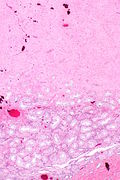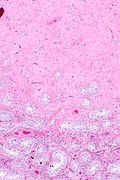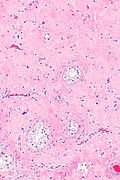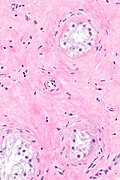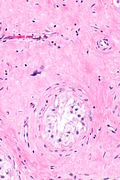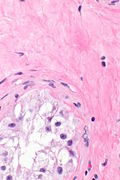Difference between revisions of "Testicular scar"
Jump to navigation
Jump to search
| (9 intermediate revisions by the same user not shown) | |||
| Line 1: | Line 1: | ||
{{ Infobox diagnosis | |||
| Name = {{PAGENAME}} | |||
| Image = Testicular_scar_--_low_mag.jpg | |||
| Width = | |||
| Caption = Testicular scar. [[H&E stain]]. | |||
| Synonyms = scar of testis | |||
| Micro = seminiferous tubules replaced by fibrosis (hyaline material with a relatively low cellularity and no nuclear atypia) +/-hemosiderin-laden macrophages, atrophic changes (see ''[[testicular atrophy]]'') | |||
| Subtypes = | |||
| LMDDx = necrotic tumour, (residual) testicular tumour (e.g. [[germ cell tumour]]) | |||
| Stains = | |||
| IHC = | |||
| EM = | |||
| Molecular = | |||
| IF = | |||
| Gross = tan brown or white, well-circumscribed | |||
| Grossing = | |||
| Site = [[testis]] | |||
| Assdx = | |||
| Syndromes = | |||
| Clinicalhx = +/-history of testicular tumour | |||
| Signs = | |||
| Symptoms = | |||
| Prevalence = uncommon | |||
| Bloodwork = unremarkable | |||
| Rads = | |||
| Endoscopy = | |||
| Prognosis = benign | |||
| Other = | |||
| ClinDDx = (residual) testicular tumour | |||
| Tx = | |||
}} | |||
'''Testicular scar''', also '''scar of testis''', is a phenomenon that may arise in the context of treatment for a [[germ cell tumour]]<ref>{{cite journal |author=Ramsey S, Kerr G, Howard GC, Donat R |title=Orchidectomy after primary chemotherapy for metastatic testicular cancer |journal=Urol. Int. |volume=91 |issue=4 |pages=439–44 |year=2013 |pmid=24021555 |doi=10.1159/000350858 |url=}}</ref> or result from the spontaneous regression of a (germ cell) tumour.<ref name=pmid16819328>{{cite journal |author=Balzer BL, Ulbright TM |title=Spontaneous regression of testicular germ cell tumors: an analysis of 42 cases |journal=Am. J. Surg. Pathol. |volume=30 |issue=7 |pages=858–65 |year=2006 |month=July |pmid=16819328 |doi=10.1097/01.pas.0000209831.24230.56 |url=}}</ref> | '''Testicular scar''', also '''scar of testis''', is a phenomenon that may arise in the context of treatment for a [[germ cell tumour]]<ref>{{cite journal |author=Ramsey S, Kerr G, Howard GC, Donat R |title=Orchidectomy after primary chemotherapy for metastatic testicular cancer |journal=Urol. Int. |volume=91 |issue=4 |pages=439–44 |year=2013 |pmid=24021555 |doi=10.1159/000350858 |url=}}</ref> or result from the spontaneous regression of a (germ cell) tumour.<ref name=pmid16819328>{{cite journal |author=Balzer BL, Ulbright TM |title=Spontaneous regression of testicular germ cell tumors: an analysis of 42 cases |journal=Am. J. Surg. Pathol. |volume=30 |issue=7 |pages=858–65 |year=2006 |month=July |pmid=16819328 |doi=10.1097/01.pas.0000209831.24230.56 |url=}}</ref> | ||
==General== | ==General== | ||
*Well-reported uncommon finding. | *Well-reported uncommon finding. | ||
*May result from the spontaneous regression of a (germ cell) tumour.<ref name=pmid16819328>{{cite journal |author=Balzer BL, Ulbright TM |title=Spontaneous regression of testicular germ cell tumors: an analysis of 42 cases |journal=Am. J. Surg. Pathol. |volume=30 |issue=7 |pages=858–65 |year=2006 |month=July |pmid=16819328 |doi=10.1097/01.pas.0000209831.24230.56 |url=}}</ref> | |||
*Can be the result of trauma, (a prior untreated) [[testicular torsion]] or infection. | |||
==Gross== | ==Gross== | ||
*Tan brown lesion. | *Tan-brown or white lesion. | ||
*Well-circumscribed. | |||
==Microscopic== | ==Microscopic== | ||
| Line 15: | Line 49: | ||
DDx: | DDx: | ||
*Necrotic tumour. | *[[necrosis|Necrotic]] tumour. | ||
*[[Germ cell tumour]], e.g. [[seminoma]]. | *[[Germ cell tumour]], e.g. [[seminoma]]. | ||
*Regressed germ cell tumour - suggestive features:<ref name=pmid16819328/> | |||
**Distinct scar +/-[[germ cell neoplasia in situ]] (GCNIS) +/-coarse calcifications (intratubular). | |||
**Scar with prominent (small) blood vessels (weakly suggestive). | |||
**Scar with lymphoplasmacytic inflammatory infiltrate (weakly suggestive). | |||
===Images=== | |||
<gallery> | |||
Image: Testicular scar -- very low mag.jpg | Testicular scar - very low mag. | |||
Image: Testicular scar -- low mag.jpg | Testicular scar - low mag. | |||
Image: Testicular scar -- intermed mag.jpg | Testicular scar - intermed. mag. | |||
Image: Testicular scar -- high mag.jpg | Testicular scar - high mag. | |||
Image: Testicular scar - alt -- high mag.jpg | Testicular scar - high mag. | |||
Image: Testicular scar -- very high mag.jpg | Testicular scar - very high mag. | |||
</gallery> | |||
==Sign out== | ==Sign out== | ||
<pre> | <pre> | ||
TESTICLE, | TESTICLE, RIGHT, ORCHIECTOMY: | ||
- TESTICULAR SCAR REPLACING | - TESTICULAR SCAR REPLACING MANY OF THE SEMINIFEROUS TUBULES. | ||
- REMAINING SEMINIFEROUS TUBULES WITH ATROPHIC CHANGES. | - REMAINING SEMINIFEROUS TUBULES WITH ATROPHIC CHANGES. | ||
- BENIGN SPERMATIC CORD AND EPIDIDYMIS. | |||
- NO EVIDENCE OF RESIDUAL GERM CELL TUMOUR. | |||
- NEGATIVE FOR MALIGNANCY. | - NEGATIVE FOR MALIGNANCY. | ||
</pre> | </pre> | ||
Latest revision as of 23:37, 15 March 2016
| Testicular scar | |
|---|---|
| Diagnosis in short | |
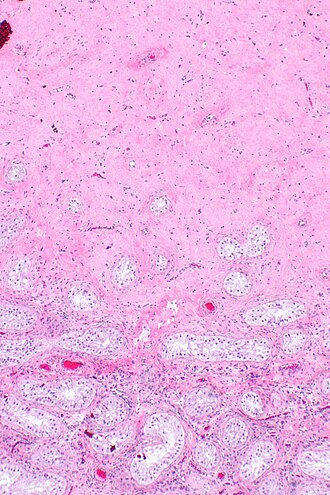 Testicular scar. H&E stain. | |
|
| |
| Synonyms | scar of testis |
|
| |
| LM | seminiferous tubules replaced by fibrosis (hyaline material with a relatively low cellularity and no nuclear atypia) +/-hemosiderin-laden macrophages, atrophic changes (see testicular atrophy) |
| LM DDx | necrotic tumour, (residual) testicular tumour (e.g. germ cell tumour) |
| Gross | tan brown or white, well-circumscribed |
| Site | testis |
|
| |
| Clinical history | +/-history of testicular tumour |
| Prevalence | uncommon |
| Blood work | unremarkable |
| Prognosis | benign |
| Clin. DDx | (residual) testicular tumour |
Testicular scar, also scar of testis, is a phenomenon that may arise in the context of treatment for a germ cell tumour[1] or result from the spontaneous regression of a (germ cell) tumour.[2]
General
- Well-reported uncommon finding.
- May result from the spontaneous regression of a (germ cell) tumour.[2]
- Can be the result of trauma, (a prior untreated) testicular torsion or infection.
Gross
- Tan-brown or white lesion.
- Well-circumscribed.
Microscopic
Features:
- Seminiferous tubules replaced by fibrosis.
- Hyaline material with a relatively low cellularity and no nuclear atypia.
- +/-Hemosiderin-laden macrophages.
- Atrophic changes[2] - see testicular atrophy.
DDx:
- Necrotic tumour.
- Germ cell tumour, e.g. seminoma.
- Regressed germ cell tumour - suggestive features:[2]
- Distinct scar +/-germ cell neoplasia in situ (GCNIS) +/-coarse calcifications (intratubular).
- Scar with prominent (small) blood vessels (weakly suggestive).
- Scar with lymphoplasmacytic inflammatory infiltrate (weakly suggestive).
Images
Sign out
TESTICLE, RIGHT, ORCHIECTOMY: - TESTICULAR SCAR REPLACING MANY OF THE SEMINIFEROUS TUBULES. - REMAINING SEMINIFEROUS TUBULES WITH ATROPHIC CHANGES. - BENIGN SPERMATIC CORD AND EPIDIDYMIS. - NO EVIDENCE OF RESIDUAL GERM CELL TUMOUR. - NEGATIVE FOR MALIGNANCY.
See also
References
- ↑ Ramsey S, Kerr G, Howard GC, Donat R (2013). "Orchidectomy after primary chemotherapy for metastatic testicular cancer". Urol. Int. 91 (4): 439–44. doi:10.1159/000350858. PMID 24021555.
- ↑ 2.0 2.1 2.2 2.3 Balzer BL, Ulbright TM (July 2006). "Spontaneous regression of testicular germ cell tumors: an analysis of 42 cases". Am. J. Surg. Pathol. 30 (7): 858–65. doi:10.1097/01.pas.0000209831.24230.56. PMID 16819328.
